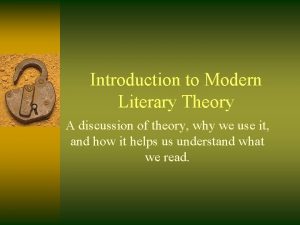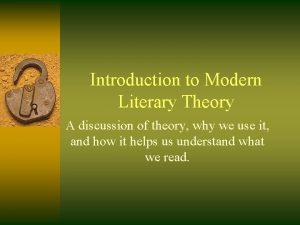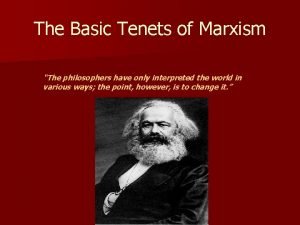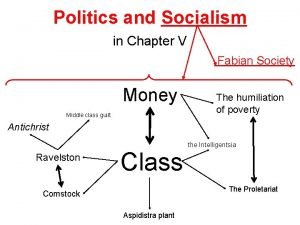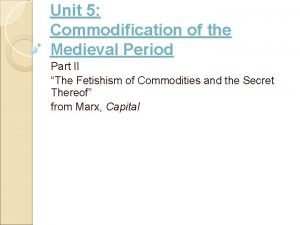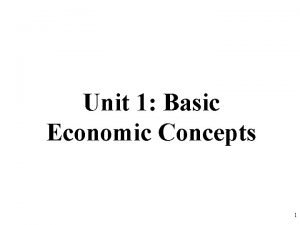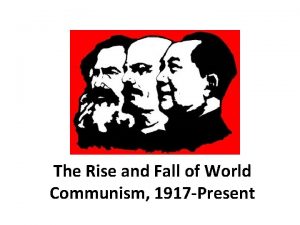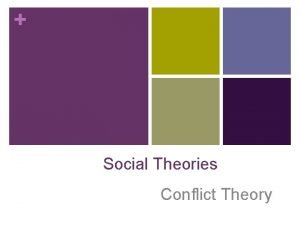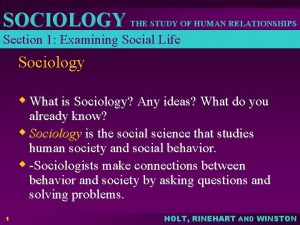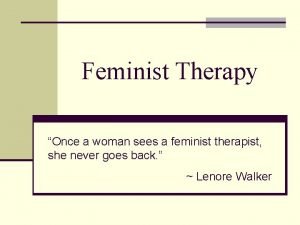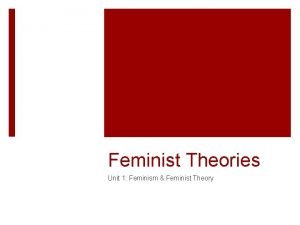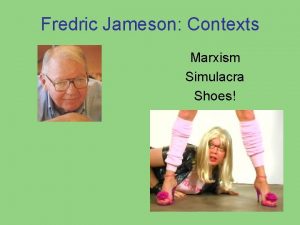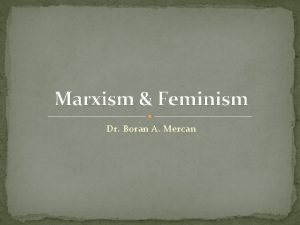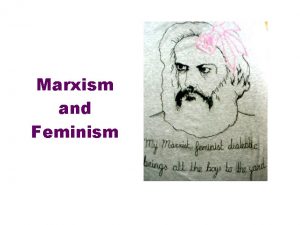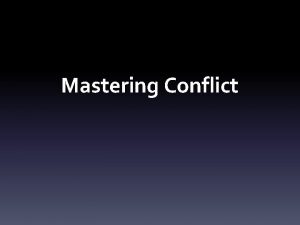CONFLICT THEORIES Marxism NeoMarxism and Feminism SIMILARITIES WITH






























- Slides: 30

CONFLICT THEORIES Marxism, Neo-Marxism and Feminism

SIMILARITIES WITH CONSENSUS THEORIES Conflict theories and Consensus theories are both examples of Structuralist theories. This means that they Look at society as a whole Look at the way society is organised on a macro level Look at society as a system of institutions They do not see individual human actions as central to the understanding of society – but they don’t rule it out either.

Conflict theories accept that cultural rules shape individual behaviour, but they claim that these rules are deliberately designed to promote or reflect the interests of some groups over others. They believe that social order cannot be naturally occurring and therefore legitimacy has to be secured through coercion or persuasion

Socialisation in society takes the form of indoctrination into the cultural rules and values that serve the continuation of systems of exploitation and oppression Dominant groups in society will try to cover this up by attempting to persuade individuals that the cultural rules are legitimate and just. Consensus is therefore manufactured in order to maintain and secure the interests of certain dominant groups in society. So while Consensus theorists like Talcott Parsons saw socialisation and value consensus as a positive thing which keeps harmony in society, Conflict theorists very much view it as a negative process which causes the oppression of disadvantaged groups. There are 2 main branches of conflict theory – Marxism and Feminism

MARXISM AND NEOMARXISM

MARXISM – CONTRADICTION AND CONFLICT Humans need food and shelter – in order to produce these they enter into “social relationships” with others (ie. We have to work together to make sure we get all of our basic needs). Producing stuff is always a social affair, hunting, farming, creating have long been done in groups. Marx saw the history of humankind as a process. In his view we are progressing through different stages in history, always moving forward, kind of like evolution on a political scale.

THE STAGES OF HISTORY Primordial Society Feudalism Capitalism Socialism Communi sm

HISTORY AS PROGRESSION Each major stage in the development of the forces of production will correspond with a particular form of the social relationships of production. For example in Feudal Britain… If you have a country where people are all spread out in rural areas, and you don’t have high tech machinery developed for individual farmers to be able to farm large plantations, then social order will be needed to stop people taking stuff from each other. That social order is provided by a state, often in the form of a Monarch. The King needs to be seen as having ultimate power and control over the country, he also needs everyone in the country to be fed, so that he can maintain control, so he divides the land among his Lords, who in turn divide the

So everything comes back to how you get stuff – we have basic needs which must be met, but we are always limited in terms of the amount of land, labour, machinery, technology we have Each society does the best with what it has in order to continue surviving and progressing. The forces of production (land, labour etc) and the social relations of production (feudalism or capitalism) form the economic base or “infrastructure” of society. It is like the spine. The other aspects of society – like the political system and social institutions like the family are known as the “superstructure” – they are there to protect the infrastructure – keep us going out to work, keep the social relations of production going. So for Marx our political values and processes of socialisation are really shaped by the way the society we live in produces stuff. For example in Britain we are taught from birth that if we work hard we will achieve more, and should be rewarded. This supports the capitalist

CONTRADICTION However, despite the manipulation and thought control of the superstructure, Marx said that there were clear contradictions in all of these societies, between those who owned the forces of production and the workers. So none of the stages of history so far have been able to survive indefinitely – as we are all working towards fairness and equality – which would be the final stage of history – communism. So far societies have relied on exploitation – Lords exploited Serfs, and Employers exploit Employees.

REVOLUTION This creates a fundamental conflict of interest between social groups – one always gains at the expense of another. This contradiction eventually results in a revolution or “paradigm shift” – which leads to the development of a new infrastructure and a new superstructure to support it.

VALUES AND BELIEFS So the values and beliefs that functionalists see as such a positive thing are actually used to support the exploitation in the system. Foe example in times of feudalism the values of “honour and loyalty” were dominant and children were taught that these were the “measure of a man”. Under capitalism we are told that nothing is more important than freedom of the individual – and that capitalism is the best way to achieve this freedom. There is a massive contradiction here for Marxists, they say we are blind to our true position – we have false class consciousness

NEO- MARXISTS The thing is, that according to Marx – the next stage of history should have happened by now – the UK has had capitalism for ages, and no revolution has happened. The only communist revolutions that have taken place have been those that were not truly Marxist in their nature as they were forced rather than coming as a result of the working classes realising they were being exploited. Capitalism has been very effective at preventing the move to the next epoch. – institutions, values and beliefs that make up the superstructure have been very effective at upholding the relationships of domination. The dominant social class has monopolised political power and

So the Neo-Marxists have come along to try and explain what happened to the Marxist revolution that we were all expecting. Neo-Marxists such as Gramsci and Marcuse have tried to emphasise the power of culture and socialisation, and to reduce the importance of the infrastructure. For example the power of advertising and the constant renewal of products keeps us spellbound, and wanting more, so we carry on working within the system. They tend to move more towards social action theories – using the power of individual interactions and individual choice as the reason why revolution has not yet occurred. They also talk about how classes can be split further, and recognise inequality faced by other groups in society i. e. women and different ethnic groups.

STRENGTHS OF MARXISM Looks at society as a whole It recognises the power interests of different groups – however this is linked to social class Good at explaining why society has changed Good at explaining why there is conflict in society – there are problems in society which are not explained by functionalism

WEAKNESSES Marxism still ignores the power of individual action – and how small groups can have an effect on society. It ignores the freedom of choice, and focuses too much on the brainwashing of people by the superstructure. Too much emphasis on conflict without recognising that capitalism has improved many people’s lives. Ignores the common interests between workers and their employers – if a business does well then the employees generally have more security of employment. Marxists claim that all cultural activity is geared to class or economic interests – but this neglects the fact that culture may actually reflect religious, ethnic or patriarchal interests

FEMINISM

CONFLICT Feminists are also conflict theorists because they see society as being divided into different social groups, but unlike Marxists they see the major division as being between men and women, rather than being between different social classes. Like Marxists they see society as characterised by exploitation, but unlike Marx they see exploitation of women by men as being the most important source of exploitation.

DIFFERENT BRANCHES There are several different branches of Feminism, however in this course we will focus mainly on three ØLiberal Feminists ØRadical Feminists ØMarxist Feminists

MALESTREAM SOCIOLOGY Feminists have criticised sociology for its focus on the public sphere of life which seems to be male-dominated. They have ignored the perceived female oriented private sphere of life – e. g. the home There is no unified theory of feminism – but they all agree that society is dominated by questions of sex and gender and women face oppression in patriarchal (male-dominated) societies.

“GENDERED KNOWLEDGE” They argue that there is a “gendered” nature of knowledge in society where conclusions are drawn about the way the world is and the way the world should be purely from the perspective of white men. As men traditionally occupy the main positions of power and authority in societies, they have in incentive to maintain their privileged position. So gendered knowledge becomes a vital force in perpetuating established social arrangements and legitimising continued male domination. Everything is tailored towards men – so called scientific studies saying men are more decisive, masculine nature of politics

RADICAL FEMINISM Radical feminism blames the exploitation of women on men – all men have benefitted from the subordination of women. Radical feminism is not necessarily interested in gender equality – it is more about the idea that there is a female or feminine nature that has been concealed or distorted throughout his-tory. Radical feminists see society as patriarchal – dominated by men- men are the ruling class and women are the subject class. The family is the key institution that oppresses women.

RAPE AND VIOLENCE Many radical feminists believe that rape and violence towards women are the methods through which men have secured and maintained power. Andrea Dworkin said that pornography encourages men to possess and control women. Rape has been used as a weapon in war, designed to humiliate, intimidate and control an enemy.

CRITICISMS OF RADICAL FEMINISM It has been argued that it is too descriptive – rather than explaining why these relationships may have come about, and how they came about. It tends to ignore the different types of oppression faced by women from different ethnic backgrounds. Encourages women to focus only on negative relationships with men – gained feminism the reputation of just being men-haters Tends to portray women as essentially good and men as essentially bad – men are treated as the enemy – which would suggest that they cannot be trusted as fathers, friends or sexual partners.

MARXIST FEMINISM Do not attribute women’s exploitation just to men – they see capitalism rather than patriarchy as being the principal source of women’s oppression. Women are exploited in their unpaid housework as wives and mothers. Women also get stuck in low paid, low status work, because of the way that capitalism emerged, ownership of the means of production fell to men, leaving women disadvantaged. For Marxist feminists not all men are necessarily bad, and women can work together with working class men to bring about communism and a system of true equality.

CRITICISMS OF MARXIST FEMINISM Some argue that Marxism is essentially a masculine theory which cannot be adapted to explain the position of women. It neglects other sources of oppression like ethnicity and sexuality. Women in societies that have claimed to be communist have still faced oppression- e. g. China, the One Child Policy. Doesn’t really explain the day-to-day relationships with men.

LIBERAL FEMINISM Probably the most widely supported of the different branches – they aim for gradual change to the social, political and economic systems of Western democracies. They argue that nobody benefits from the inequality faced by women as the potential of both women and men is suppressed. Women may not get the same chances at work, but men are prevented from having close relationships with their children. Socialisation into gender roles has the consequence of producing rigid and inflexible expectations of men and women.

Liberal feminists tend to believe that emancipation is possible through education – society is progressing. Women have been able to achieve progress through working within existing institutions like the UN.

CRITICISMS OF LIBERAL FEMINISM Criticised for being based on make assumptions and norms. Still ignoring the private sphere – ignores the power relations that exists in personal relationships. Fights for changes that are too limited to free women from oppression. Rejected by black feminists for assuming that all groups of women have shared interests and needs. Fails to properly explain the exploitation of women – takes no account of structural inequality.

GENERAL STRENGTHS AND WEAKNESSES OF FEMINISM Strengths Weaknesses Gives women a voice May be ignoring wider factors such as class and ethnicity Raises awareness of gender issues Balances perspectives by seeing things from a woman’s point of view Enabled women to write about women Overlooks the oppression and exploitation faced by certain men.
 Marxism and feminism similarities
Marxism and feminism similarities Structuralism can be viewed as an extension of formalism
Structuralism can be viewed as an extension of formalism Marxist theory of state
Marxist theory of state Historical materialism of karl marx
Historical materialism of karl marx Neomarxism
Neomarxism Www.youtube.comw
Www.youtube.comw Chomsky vs piaget
Chomsky vs piaget Base superstructure
Base superstructure Karl
Karl Advantages and disadvantages of new historicism
Advantages and disadvantages of new historicism Marx base and superstructure
Marx base and superstructure New criticism
New criticism Marxism crime and deviance
Marxism crime and deviance Principles of marxism
Principles of marxism Fabian socialism vs marxism
Fabian socialism vs marxism Functionalism vs marxism
Functionalism vs marxism Cinderella marxist lens
Cinderella marxist lens Class struggle marxism
Class struggle marxism Death of a salesman marxist criticism
Death of a salesman marxist criticism Marxism in international political economy
Marxism in international political economy Elements of marxism
Elements of marxism Example of marxism
Example of marxism Examples of communism
Examples of communism Great purge
Great purge Karl marx 1818 to 1883
Karl marx 1818 to 1883 Conflict theory definition
Conflict theory definition Conflict theorist
Conflict theorist Setting of the story of an hour
Setting of the story of an hour What is post feminism
What is post feminism Feminist snow white
Feminist snow white Characteristics of patriarchy
Characteristics of patriarchy









